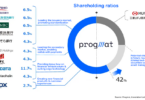Today, Australian blockchain firm Power Ledger announced an extension of its trial with Japan’s Kansai Electric Power Company (KEPCO) to create and track renewable energy certificates (RECs) along with solar energy trading.
The two firms previously completed a peer to peer (P2P) energy trading trial for surplus power in Osaka, with automatic settlements using cryptocurrency. Under the new agreement, KEPCO will use Power Ledger’s blockchain platform to create, track, trade and provide for the settlement of non-fossil value (NFV) certificates (a type of REC) generated by rooftop solar systems.
In 2018, Japan started issuing NFVs as proof that electricity came from a renewable energy source. The NFVs can be used by enterprise electricity consumers to comply with RE100 standard, a global initiative for corporates committed to using 100% renewable electricity.
To date Power Ledger’s tests and deployments have been more focused on P2P energy trading than RECs. But the underlying process is not dissimilar, i.e. tracking and measuring solar production and its transfer to a customer. Now, the blockchain will track a REC through its lifetime — from generation to being claimed.
“The market for trading environmental commodities is evolving rapidly, and there is mounting pressure to ensure credits aren’t double-counted. Power Ledger is building an operating system for the new energy marketplace,” said Jemma Green, Co-founder and Executive Chairman of Power Ledger.
Using the blockchain platform, KEPCO customers can trade RECs among themselves. The REC tokens generated by Power Ledger will be stored in a central KEPCO wallet. The trial will start in December 2019 and is expected to go on till March 2020.
“We identified there were additional opportunities to build on our original successful trial with Power Ledger to create an innovative business model for P2P energy trading between participants at houses, businesses and energy aggregators in Japan,” said Fumiaki Ishida, General Manager at KEPCO.
KEPCO has previously worked with Japanese blockchain firm BUIDL on a blockchain energy trading platform using electric vehicles (EV). The platform was built on the Etheruem blockchain and enabled EVs to monetize their batteries when idle.
Last year, KEPCO partnered with the University of Tokyo, Nihon Unisys and Mitsubishi UFJ Bank for a blockchain payments system for energy trading, a Green Tech Media report said.
Meanwhile, Power Ledger has secured commercial deals in Australia and is running trials in India, Malaysia, Japan, Thailand and the United States.






